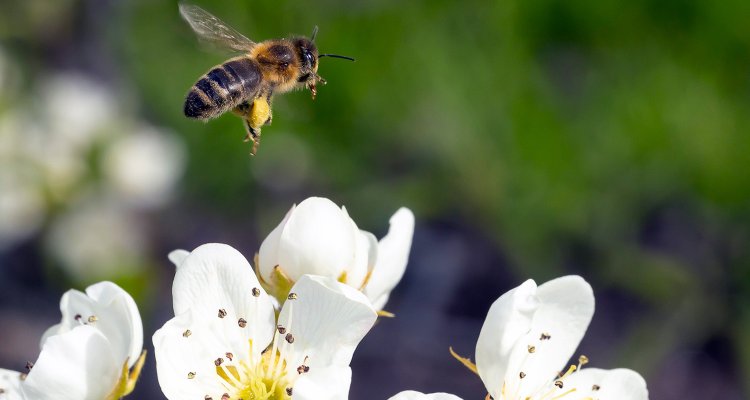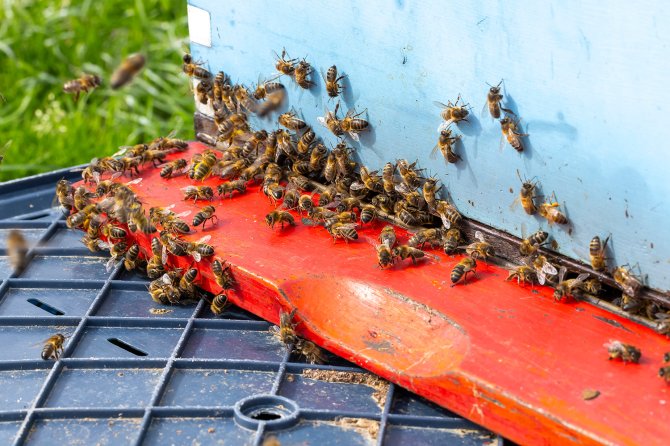
Background
Why balanced nutrition is important for bees and their colony
Honeybees that collect food for the members of their colony choose from a wide range of flowers. The bees know what nutrients they need and if something is missing, they try to compensate. For example, when a honeybee colony lacks certain essential fatty acids or amino acids in their nutrition, their foragers go out and try to collect these nutrients from pollen. Having a wide variety of flowering plants available for bees is therefore important, so that they can put together an optimal diet.
In recent years, there has been a lot of research into the importance of balanced nutrition. Researchers have shown that bees prefer foods containing elements in which they were previously deficient. ‘They choose a certain nutritional composition. If you first feed them a diet deficient in certain substances, they will then start collecting food containing those substances to compensate for the deficiency. We were able to demonstrate that with experiments. Which is why bees fly to a variety of plants. They can also communicate about food supply through the bee dance. Through the intensity of the dance, they inform other bees about food quality,’ says Harmen Hendriksma, bee researcher at Wageningen University & Research. It is therefore important to have an adequate diversity of plants nearby, which is increasingly difficult in monoculture farming today.
Deficiencies
Several studies in Wageningen, Israel and the US demonstrate what happens when bees do not get nutrients in sufficient quantities. Problems can arise due to dietary deficiencies and research emphasis has been on the effects of insufficient sugar, protein and fat. ‘If a generation is consistently undernourished it shortens the lifespan, which can threaten the survival of their population,’ Hendriksma says.
Essential fatty acids, particularly omega-3 and omega-6, play a critical role in the health and cognitive function of both humans and bees. These essential fatty acids are crucial for brain development and function. A deficiency in these nutrients can negatively impact cognitive abilities, such as learning, memory, and decision-making. Within a colony, 'dumb' bees have little value. ‘They do not properly recognise colony diseases, resulting in poor population hygiene. They can also misunderstand each other during their bee dance communication. They make more mistakes when looking for food because they have poor navigation skills and they get lost more easily. Bees rely on the cognitive abilities of individual bees as well as their ‘hive mind’, for instance, to collectively gather food and swarm. Cognitive impairment can therefore can have significant consequences for the reproduction and survival of bee colonies,’ Hendriksma says.
Amino acids
Hendriksma himself is studying the effects of deficiencies in essential amino acids, the building blocks of proteins. These are necessary for optimal growth and development. ‘Like building strong flight muscles, which is very important for the workers whose task is to collect nectar and pollen. In another way, for nurse bees, amino acids are essential because they ensure the strong development of the glands they use to make jelly. The jelly produced is fed to larvae, drones, foraging bees and the queen,’ says the researcher.
An incorrect composition of amino acid nutrition causes this to fall short. You then get nurse bees that cannot make enough food and foraging bees that cannot fly well.
Yet too much protein nutrition is not good either. When the protein breaks down, free radicals are produced through deamination, and the resulting oxidative stress shortens their lifespan. Thus, for multiple reasons, it is very important to optimally balance the nutritional intake of protein.

Learning capacity
Amino acids, like fatty acids, are also important for learning ability and memory. A good bee brain is essential for finding the right food plants but also for flying back home efficiently.
The bees share information about the requirements in their colony via food exchange and via the intensity of their bee dances, after which recruited foraging bees actively search for what their colonies need. Bees can taste with receptors in their mouths, on their legs and on their antennae. They can thus forage on different plants to find the necessary food. However, this is more difficult to achieve when flower diversity is reduced, such as in large-scale agricultural areas. Here, certain agricultural crops may dominate, providing minimal food alternatives for bees to achieve dietary sufficiency.
Supplementary feeding?
A survey found that 6% of Dutch beekeepers supplement their hives with a protein source. In contrast, at large-scale beekeeping companies in the US, protein supplementation is a standard practice to support bee colonies in times of food shortage. Applied bee researcher Jolanda Tom is currently conducting a series of trials to compare several types of supplementary diets. ‘We are looking at the effect on brood development in bee colonies. The study still continues, so we cannot disclose results yet. However, we did see a trend in the 2022 annual survey that beekeepers who supplement sugar and/or protein lost fewer hives in the winter months,’ she says. Supplementing colonies with sugar and protein is an option for beekeepers to prevent their bees from insufficient nutrition and starvation.
More flowers for bees!
For bright strong bees, a variety of flowers is important - all year round. There are beekeepers, citizens, farmers and governments sowing flowers to support bees. Field edge projects in agriculture and targeted mowing management on roadsides also promote more herb-rich vegetation. The supply of flowers can thus be adjusted to ensure long periods with a diverse supply of nectar and pollen. Flowering shrubs and trees are especially welcome because they bear huge numbers of blossoms every year.
Especially in springtime, a lot of pollen needs to be collected quickly to rapidly build up a colony. Thereafter, in summer and autumn, there must be plenty of flowers available to pick from too. All this is necessary to ensure strong healthy bees that are well equipped to survive the winter months.